Asia Communique
The end of "Wolf Warrior" diplomacy? — US leaders visit Taiwan — CCTV military reports — COVID surge in Southern China — BRICS Foreign Ministers' meeting
The end of "Wolf Warrior" diplomacy?
On June 1, the Politburo of the Central Committee held a study session in which Xi Jinping “emphasised that telling Chinese stories, spreading the voice of China, and presenting a true, three-dimensional and comprehensive China are important tasks for strengthening my country's international communication capabilities”.
Several news agencies — including Bloomberg — jumped on one word mentioned in Xi Jinping’s remarks: “lovable”.
“Xi Seeks ‘Lovable’ Image for China in Sign of Diplomatic Rethink”, said a Bloomberg headline.
Let’s look at the original text where “lovable” was mentioned.
“要注重把握好基调,既开放自信也谦逊谦和,努力塑造可信、可爱、可敬的中国形象”
“We should focus on grasping the tone, be open, confident, modest and modest, and strive to create a credible, lovely/desirable and respectable image of China.”
The word 可爱 in Chinese translates as cute or something desirable. Reading 可爱 as “lovable” misses the point about what Xi was saying. Xi Jinping wasn’t talking about changing the course of China’s foreign policy to make it more “lovable”. Instead, Xi said that China should be made a more “desirable” or “attractive” option. What is considered desirable will vary, and by making those remarks, Xi Jinping was in no way talking about softening China’s foreign policy approach.
“Nevertheless, Martin still manages to extract titbits that reveal the petty victories and pratfalls of those on the front line of modern China’s diplomatic development.
He also shows that China’s wolf-like approach is, in fact, long in the tooth, and China’s diplomatic service is still operating in the same pseudo-military style instituted in 1949 by its founder, Zhou Enlai,” said a review of Peter Martin’s new book on Wolf Warrior diplomacy.
“Zhang has repeatedly urged “self-confidence” in China’s model and in the building of a “Chinese discourse” grounded in self-confidence that can then be applied in public diplomacy. In a 2014 talk called “Chinese Must Have Self-Confidence” (中国人你要自信), Zhang urged an end to uncertainty: “Let us remove the hat of flagging self-confidence and give it to our opponent,” he said. It was with this newly asserted self-confidence that China should combat the distortions and misunderstandings of the West” an analysis published by China Media Project said.
China Media Project offers an excellent analysis of why Xi Jinping’s isn’t about to change the course of China’s policies.
Powers of Persuasion — China Media Project
“China has been spending up to US$10 billion a year on its vast global propaganda campaign since 2009, but critics say such efforts have not been very effective in improving the country’s image or helping foreign nations better understand China”, reported Apple Daily.
“The retrospective probes mark a shift in Chinese leader Xi Jinping’s long-running anticorruption drive, which has helped him purge rivals and concentrate power, and has mainly targeted people involved in recent or continuing abuses—a practice that some officials regarded as a quasi-amnesty for those who showed restraint after Mr Xi took power in late 2012” reported WSJ.
US leaders visit Taiwan
Tammy Duckworth and Dan Sullivan of the Senate Armed Services Committee and Christopher Coons of the Senate Foreign Relations Committee briefly visited Taiwan on Sunday.
“Duckworth was in Taiwan for a brief three-hour stopover Sunday morning along with senators Dan Sullivan and Christopher Coons after the trio visited South Korea. They touched down at 7:19 a.m. and delivered brief addresses before meeting with President Tsai Ing-wen,” reported Focus Taiwan.
“The United States' pledge to donate 750,000 COVID-19 vaccines to Taiwan has sent a strong and clear message of its support for the country, and the government is grateful for that, the Ministry of Foreign Affairs (MOFA) said Sunday”, reported Focus Taiwan.
BRICS Foreign Ministers’ meeting
The foreign ministers of BRICS countries met virtually on Tuesday to discuss challenges because of the COVID-19 pandemic and other matters.
“The Ministers expressed grave concern over the continuing public health, societal and economic impact of the COVID-19 pandemic globally. They expressed condolences for lives lost and pledged solidarity with the affected families,” a statement said.
“Asserting that both Prime Minister Narendra Modi and Chinese President Xi Jinping are, “responsible” leaders, Russian President Vladimir Putin on June 5 said they both are capable of solving issues between the two countries, and that it was important that no “extra-regional power” should interfere in the process” reported The Hindu.
“Noting that China has provided more than 350 million doses of COVID-19 vaccines to the international community, Wang said it is hoped that BRICS will continue to make vaccines global public goods, adhere to the principle of fair and reasonable distribution, support the World Health Organization in accelerating the implementation of COVAX, and support the World Trade Organization in making an early decision on an IPR waiver for COVID-19 vaccines” reported Xinhua.
“We strive for a fair, just, inclusive, equitable and representative multipolar international system. It is one based on international law and the UN Charter, that recognizes the sovereign equality of all States, and respects their territorial integrity while displaying mutual respect for interests and concerns of all," Minister Jaishankar said.
“In addition to the lack of cotton clothing, the Indian border troops also lack supplies. Earlier, in a video uploaded to the Internet, an Indian soldier complained that the food of the Indian border troops was too poor to swallow, and pointed the finger at "military corruption," which aroused many concerns. . The Indian military quickly dispatched commissioners to the scene to investigate the matter. The protagonist of the video, Tej Bahadur Yadav, belongs to the Indian Border Security Force and is stationed at the border between India-controlled Kashmir and Pakistan,” said a post published on WeChat. This post was widely shared on WeChat and appeared on the home page.
“A Chinese court has jailed a popular blogger over posts suggesting the death toll among Chinese soldiers in a China-Indian border clash last year was higher than claimed.
Qiu Ziming was among at least six people arrested in February for online posts about the Galwan Valley clash between Chinese and Indian troops in a disputed border area. A tense standoff that began in May escalated to shouting matches, stone-throwing and fistfights, before culminating on 15 June into a violent bout of hand-to-hand combat with clubs and stones, leaving dozens dead,” reported the Guardian.
Internet celebrity sentenced to 8 months in jail for defaming martyrs — Global Times
Next week, India-China will mark the one-year anniversary of a deadly border clash in Galwan valley.
16 Chinese jets in Malaysian airspace
The Malaysian Air Force announced on Jun 1 that a fleet of 16 People’s Liberation Army Air Force aircraft had entered their ADIZ without prior communication.
“The Chinese planes were detected flying between 23,000 feet and 27,000 feet above sea level at a speed of 290 knots entering the Malaysian Maritime Zone (ZMM).
There was no response from the planes after being told to turn back by the Malaysian Air Traffic Control, and they instead headed towards Sarawak waters. The RMAF then scrambled Hawk 208 fighter jets from the 6th Squadron of the Labuan Air Base to intercept the foreign planes,” reported Free Malaysia Today reported.
Malaysia identified these aircraft as Ilyushin Il-76 and Xian Y-20 strategic transport planes.
“The Xian Aircraft Industrial Corporation delivered the first Y-20 to the Chinese air force in 2016, and it has been nicknamed “Chubby Girl” because of its stocky shape. It’s not known how many are in service, but the Y-20 fleet is estimated at more than 20” reported SCMP.
“Obviously, the 16 Chinese Air Force aircraft abided by international law and the routine flight training has nothing to do with "intrusion." Although China and Malaysia have overlapping territorial claims, these disputes are within the scope of the two countries bilateral relations. They should not be exaggerated” reported Global Times.
Chinese foreign ministry and the state media have called the intrusion merely a “support mission”.
“Obviously, the 16 Chinese Air Force aircraft abided by international law and the routine flight training has nothing to do with "intrusion." Although China and Malaysia have overlapping territorial claims, these disputes are within the scope of the two countries bilateral relations. They should not be exaggerated” reported Global Times.
Tiananmen anniversary
No mass gatherings were allowed in Hong Kong to commemorate the anniversary of the Tiananmen Square movement. Several small gathering did take place in Hong Kong despite the restrictions.
“But this year, for the second time in Hong Kong’s history, the annual candlelight vigil is banned. Amid ongoing political repression, the government cites the coronavirus pandemic as a reason to prohibit the public memorial service. This year, like last, I will instead light my own candle half a world away. Unsure of when, if ever, I will return home,” said Hana Meihan Davis in HKFP.
“Shanghai-based Xiaohongshu—which means “Little Red Book” in Chinese and is backed by Alibaba Group Holding Ltd. and Tencent Holdings Ltd. —wrote in a post on China’s Twitter-like Weibo platform on June 4, “Tell me loudly, what is the date today?” reported WSJ.
“The Friday post, which was shared on the 32nd anniversary of the day that Chinese troops crushed peaceful student protests in Tiananmen Square, was quickly deleted. By midnight Friday in China, Xiaohongshu’s entire Weibo account—which had 14 million followers—had disappeared, replaced by a message that said the account was unavailable for suspected violations of laws and regulations,” reported WSJ.
“Unsurprisingly, some of the banned activities underscore Beijing’s authoritarianism. These include a ban on nose-picking, putting underwear over the head, fortune telling, and displaying tattoos. Other violations echo what is already censored in the world’s largest country, such as gambling and politically sensitive content,” said Will Henney.
COVID surge in Southern China
The COVID-19 cases continue to surge in Southern China provinces.
“The State Council inter-departmental task force for COVID-19 response has dispatched a work team to south China's Guangdong Province to guide the region's efforts in curbing local COVID-19 breakout, a spokesperson said on Monday” reported Xinhua.
Mass testing across Guangzhou is currently underway to stem the spread of COVID.
Even though the reported positive COVID-19 cases remain artificially low, there is an extensive discussion and engagement on Chinese social media.
5 of the top 10 trends on Baidu are related to rising COVID-19 cases.
CCTV military reports
[Military report] Direct attack training ground, 5800 meters above sea level, extreme training for highland scouts — CCTV-7
[Military Report] News feature: Literary and artistic light cavalry active in the Karakorum — CCTV-7
Why should I go to the most difficult place to be a soldier? — WeChat
A series of pictures were shared on WeChat showing a PCP-001 with an 82mm rocket launcher.
“The PCP001 self-propelled 81mm rapid-fire mortar system mounted on a Mengshi chassis, developed in 2008, provided battalion-echelon fire support. Over the next two years, additional units fielded similar systems in the mountains of Tibet and in northeastern China near the North Korean border, with the latter becoming the first to test a full HIMOB combined arms battalion construct in 2014,” wrote Joshua Arostegui about PCP001.
[Defense Military Zaobao] Heart-warming gift blessings from the plateau — CCTV7
“The PLA’s task force dedicated to the unknown objects increasingly relies on AI technology to analyse its data, according to Chen’s report, which is in line with several other military studies published in domestic journals, most recently in August last year”, reported South China Morning Post.
Don’t Miss Out
“Huawei is working with various government entities to establish the UAE as a “globally trusted digital oasis” that is safe from potential cyber threats, according to its chief security officer for the UAE.
The Shenzhen-based company created the new post of CSO last October amid the Covid-19 pandemic to help the Emirates achieve its goal of setting up smart cities and e-governments while “keeping the nation’s critical infrastructure safe”, said Aloysius Cheang” reported The National UAE reported.
“The US is seen as too obsessed with the Ream naval base as well as any other facilities on the Cambodian coast that can harbour large ships and airplanes, military or commercial. Their accusation keeps changing from one spot to another,” said an editorial in Khmer Times.
“Fear of losing out to China in their hegemonic competition has made the US lose its cool and become restless, ready to pick up on any country, big or small, or anything that looks Chinese. The worst form of it being anti-Asian violence and racism in America,” the editorial in Khmer Times added.
“A herd of elephants that packed its trunks for an unexpected 500km (300 miles) trek has arrived at a Chinese city where millions of people live. The 15 elephants have been hoovering up crops and poking their noses through doors on the march from the south of Yunnan province to its capital Kunming” reported the BBC.
“The next-generation mobile communication technology will integrate with advanced computing, big data, artificial intelligence (AI) and blockchain, according to a white paper issued by the IMT-2030 (6G) Promotion Group that was established in June 2019 under the guidance by the Ministry of Industry and Information Technology” reported Xinhua.
‘Stronger’ Bets the United States Can Outlast China — Foreign Policy
Movers and Shakers
The Taiwan Temptation — Foreign Affairs
The Myth of Authoritarian Superiority: China’s Response to Covid-19 Revisited — Yanzhong Huang
The evolving nature of China’s military diplomacy: from visits to vaccines — Meia Nouwens
Chaos in Myanmar Is China’s Nightmare — Jason Tower and Priscilla Clapp
Xi Jinping's Xi'an Visit Indicates CCP Objectives and Centrality of Loyalty to the Party — Drew Thompson
Explaining the asymmetry in the Sino-Indian Strategic Rivalry — Manjeet Pardesi
Will US-Russian relations still restart? — Zhao Huasheng
Business Street
The new geopolitics of global business — The Economist
Off-Track Reads
Science and Pseudoscience in India — Foreign Policy
Covid has exposed the great fiction of middle-class life in India — The Economist
Didi’s Big Debut — The Wire China
Moral Arbiters: Should China’s Judges Uphold More Than Just the Law? — Sixth Tone
China will soon open a new stretch of rail across Tibet — The Economist
Upcoming Watch
From June 7 to 8, China will host a face-to-face special ASEAN-China foreign ministers' meeting and a Lancang-Mekong Cooperation (LMC) foreign ministers' meeting in Chongqing Municipality.
On June 9, Mongolia will hold the presidential election.













